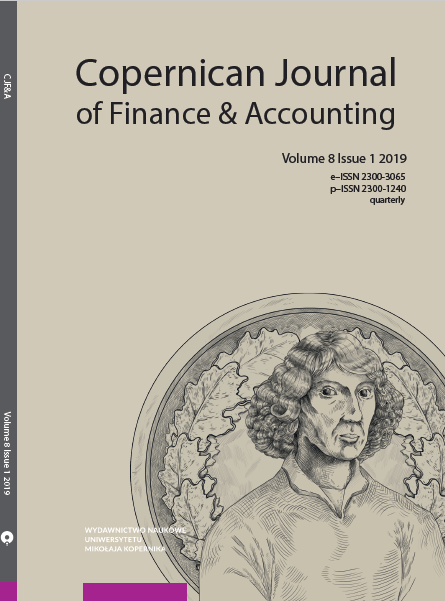THE TENDENCY OF HOUSEHOLDS TO INVEST IN AN ECOLOGICAL MODERNIZATION OF THE UTILIZED HEATING SOURCES
DOI:
https://doi.org/10.12775/CJFA.2019.002Keywords
investments, corporate social responsibility, smog, heating, ecology, household financesAbstract
The aim of the article is to determine the impact of economic aspects on the decision-making process on modernization of heating sources used by households in the largest cities of the Kuyavian-Pomeranian Voivodeship. Excessive use of obsolete and worn out heating sources contributes significantly to intensive air pollution, especially during the winter season. The article uses a questionnaire survey carried out in the form of an online survey, addressed to the residents of Bydgoszcz, Toruń and the surrounding area. The survey was conducted using the google form, which was sent to random users of social networks. The form was also published on groups associating residents of Bydgoszcz and Toruń, as well as student groups of these cities. As a result of the survey we managed to obtain 153 correctly filled questionnaires. The analysis was based mainly on the analysis of the frequency of responses given and the analysis of correlations. Because of this analysis, it can be concluded that the decisions related to the choice of the type of a new heating source and its level of environmental performance are mainly related to economic aspects, not over-care for the natural environment. A large proportion of respondents believe that they are willing to allocate an additional sum of money to the planned purchase only due to ecological values, however a large part of them declares sums that are really too small to translate into a more environmentally friendly product. It means that for the surveyed the main group of factors affecting the selection of the heating source are economic factors, and the added value which is less emission of harmful pollutants often goes to the background (although it is not completely insignificant). It results from the fact that ongoing subsidy programs are the most effective form of improving the situation, however, the level of funding should bring the price of ecological furnaces closer to their traditional, cheaper counterparts.References
Budzynski, W., & Bielski, S. (2006). Agricultural raw materials of agricultural origin, Part II. Biomass as solid fuel. Acta Scientiarum Polonorum. Agricultura, 3(2), 15–26.
Kaczmarczyk, M. (Ed.) (2015). Low emission – from the reasons for occurrence to the elimination methods. Krakow: GLOBEnergia.
Lesniak, W., Janczar-Smuga, M., Podgorski, W., & Klinkowski, M. (2012). Heat pumps – an ecological source renewable energy. Acta Scientiarum Polonorum. Agricultura, 3(6), 78–89.
Mikłaszewski, A. (2017). Low emission and its impact on health. Wrocław: Lower Silesian Ecological Club.
Morris, C., & Pehnt, M. (2017). German energy transformation – the future based on renewable energy sources. Berlin: Heinrich Böll Stiftung.
Nowak, T., & Kowalczyk, J. (2015). Magnetic fields of permanent magnets as an effective source of organic thermal energy production. Electronics: constructions, technologies, applications, 56(9), 100–101.
(www1) Greenpeace: facebook, http://www.facebook.com/greenpeacepl/videos/1948557418785597 (accessed: 27.01.2019).
(www2) Misja – emisja, http://misja-emisja.pl/knowledgebase/wdychamy-gdy-spalamy-wegiel-biomase (accessed: 27.01.2019).
(www3) Business Insider Polska, http://businessinsider.com.pl/rozwoj-osobisty/zdrowie/jak-chiny-walcza-ze-smogiem/k2r1bz1 (accessed: 28.01.2019).
(www4) Miasto Bydgoszcz, http://www.bydgoszcz.pl/rozwoj/srodowisko/powietrze/dotacja-na-wymiane-ogrzewania-program-ekopiec-2018 (accessed: 29.01.2019).
(www5) Miasto Toruń, http://www.torun.pl/pl/dotacje-na-wymiane-piecow (accessed: 29.01.2019).
(www6) Ekologia, http://www.ekologia.pl/srodowisko/ochrona-srodowiska/smogczy-rzeczywiscie-jest-taki-grozny,22433.html (accessed: 27.01.2019).
Downloads
Published
How to Cite
Issue
Section
Stats
Number of views and downloads: 391
Number of citations: 0



